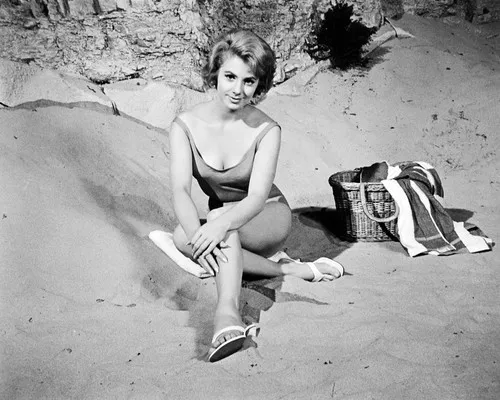Before she became America’s musical sweetheart, Shirley Jones was just a small-town girl with a big voice and even bigger dreams. Born on March 31, 1934, in Charleroi, Pennsylvania, Shirley Mae Jones was named after famed child star Shirley Temple—perhaps a sign of destiny.
Raised in nearby Smithton, she grew up in a loving home where music was more than background noise; it was a way of life. Her parents, owners of a small brewery, encouraged her passion, enrolling her in voice lessons from the age of six. She had a natural soprano voice, one that would eventually take her from high school stages to Hollywood spotlights.
Jones initially pursued a career in veterinary science, enrolling at a college in Pittsburgh. But fate had a different path in mind. While vacationing with her parents in New York City, she decided on a whim to audition for a casting call at the Brill Building. It was there that her talent stunned Rodgers and Hammerstein’s music director, who promptly arranged for her to audition for the legendary duo themselves. Richard Rodgers was so impressed, he signed her on the spot—a virtually unheard-of moment in Broadway history.
She became the first and only performer personally signed to a contract by Rodgers and Hammerstein, leading to her Broadway debut in South Pacific. Not long after, she made a seamless transition to film with her screen debut as the wholesome Laurey Williams in Oklahoma! (1955). The film was a box office success and launched Jones into stardom. Her natural charm, crystalline voice, and Midwestern appeal made her a favorite in Hollywood’s golden era of musicals.
Jones quickly followed Oklahoma! with Carousel (1956), where she portrayed Julie Jordan, a role that demanded emotional depth and vocal range. Her performance earned critical acclaim, further cementing her reputation as a musical starlet with dramatic potential. Then came The Music Man (1962), where she played Marian Paroo opposite Robert Preston. Her portrayal of the reserved librarian with a soft heart was another resounding success and remains one of her most iconic roles.
However, Jones wasn’t content with being typecast as the innocent girl-next-door. In 1960, she surprised both fans and critics with her Oscar-winning performance in Elmer Gantry. Cast against type as Lulu Bains, a former preacher’s daughter turned prostitute, Jones displayed impressive dramatic range. The role earned her the Academy Award for Best Supporting Actress and transformed her public image. It was a bold move, and one that paid off, proving that she could hold her own in heavy drama as well as musicals.
Offscreen, Shirley Jones’s personal life was just as storied. She married singer and actor Jack Cassidy in 1956, with whom she had three sons, including Shaun Cassidy, who would later become a teen idol in his own right. Their marriage was tumultuous, marked by Jack’s infidelities and personal demons, but Jones remained committed for nearly two decades before they divorced in 1974.
Despite the heartbreak, she later found happiness again with comedian and actor Marty Ingels, whom she married in 1977. Their union, while unconventional and sometimes controversial, lasted until Ingels’s death in 2015.
In the 1970s, Shirley Jones found renewed fame with a new generation of fans as the matriarch of The Partridge Family, a hit television series that ran from 1970 to 1974. As Shirley Partridge, a widowed mother who forms a pop band with her five children, Jones combined maternal warmth with musical prowess. Acting alongside her real-life stepson David Cassidy, she became a television icon, once again showcasing her versatility. The show not only revived her career but made her a pop culture figure across two generations.
Even after her prime years in film and television, Jones never stopped working. She continued performing in stage productions across the country, including revivals of The Sound of Music and The King and I. Her dedication to her craft, combined with a tireless work ethic, kept her relevant for decades. She also made numerous guest appearances on TV shows, maintaining her visibility in the public eye.

Jones has always carried herself with grace and humility. In interviews, she often reflected on her gratitude for the opportunities she received and credited much of her success to good timing, strong values, and her love for performance. Unlike many of her contemporaries, she managed to avoid the pitfalls of fame, maintaining a steady career and a strong connection to her fans.
As she entered her later years, Shirley Jones remained a beacon of talent and dignity in the entertainment industry. She published her memoir Shirley Jones: A Memoir in 2013, offering an unflinching look at her career, her marriages, and her life behind the scenes. The book revealed a woman who was not just a star but a survivor—resilient, open-hearted, and unafraid to reveal her struggles.
Today, Shirley Jones is celebrated not only for her contributions to American musicals but for her lasting impact across television, stage, and film. Her career spans over six decades, marked by reinvention, resilience, and a voice that once carried the hopes of Rodgers and Hammerstein. She is, in every sense, a legend—an enduring songbird whose legacy continues to resonate with audiences young and old.




